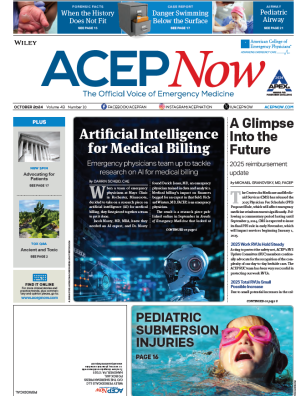Since the dawn of the attempt to diagnose and treat the afflictions of our fellow humans, each generation of healers has brought something new to our knowledge base and refuted something old.
Explore This Issue
ACEP News: Vol 31 – No 03 – March 2012We wash our hands now, and we draw blood for testing, not for draining evil humors. (Possibly we do too much of both of these.) We know that psychiatric disease and seizures are true illness and not demonic possession. Major Walter Reed controlled yellow fever not by treating the patient but by eliminating mosquitoes. It is amazing how the dogma of yesterday is occasionally replaced by wonderful new ideas.
I recall sitting in a crowded lecture hall as a medical student listening to the infectious disease specialist discuss this new illness called AIDS. This was really big stuff, and it began a new era in medicine.
Some of the newer “discoveries” I have encountered since then seem to be less important.
The significance of these new diagnoses is less clear than that of diseases such as multiple sclerosis or lupus. The criteria for diagnosis seem to be less precise than other maladies, and effective treatment is lacking. We see these patients every day and wonder how one of our colleagues has come to the conclusion that a patient has one of these new diagnoses.
Fibromyalgia, cyclic vomiting syndrome (CVS), and neurocardiogenic syncope (NCGS) are three relatively new diagnoses that when made indiscriminately have questionable veracity.
Before someone from the Cyclic Vomiting Syndrome Association gets their dander up, I’ll say that I’m sure there are plenty of bona fide patients who have these illnesses. It seems, however, that these diagnoses get tossed around like we tell people they might have a viral illness or constipation. It is the uncritical use of these diagnoses that harms those that truly have the illness.
Are we doing anyone a favor by labeling them with a term that suggests they have a problem not related to its root cause?
Traditionally CVS has been a diagnosis made in children. Lately I’m seeing adults newly diagnosed with this. Could this be a real entity? Sure, but I’m suspicious when many of these patients are heavy users of either oral opiates or marijuana. Possibly the nuclear explosion of opiate use in the United States has something to do with this.
Also, since the illness in adults seems to be rooted in panic disorder, maybe a better term for what these patients have would be anxiety-related vomiting. Calling an illness by a more specific name may help to direct therapy to the root cause.
Pages: 1 2 3 | Single Page




No Responses to “Can’t Stop the River”